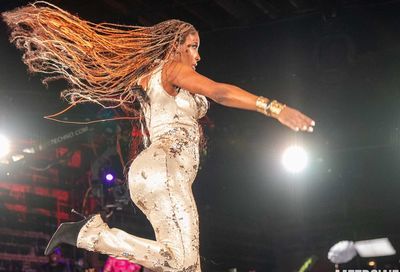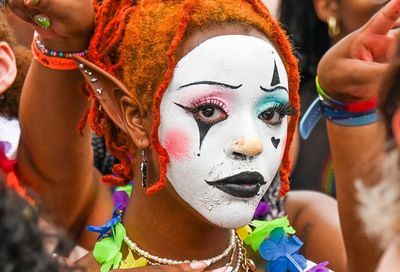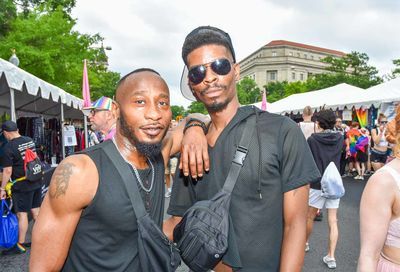Revivals and Reunions
Bernadine Mitchell turns "Bessie's Blues" into a powerhouse evening, while Round House takes a feminist point of view

Twenty years ago, Studio Theatre won six Helen Hayes Awards with its production of Bessie’s Blues by Thomas W. Jones II. The Atlanta-based Jones has gone on to work regularly with MetroStage — so too the show’s star, Bernardine Mitchell — and the Alexandria-based theater company decided to celebrate him and the show by reviving it as part of its own 30th anniversary season.
If, like me, you missed its first outing, you might wonder what all the fuss was about. You’ll certainly wonder how it was possible the show won every award in which it was nominated — except for Best Actress. Mitchell reprises the lead role at MetroStage, and maybe she is just altogether better suited for it now than she was then. Whatever the case, she is the chief reason to see the revival. Mitchell has one of the most powerful voices around, with stupendous range: Besides the show’s namesake Bessie Smith, she’ll also put you in mind of other blues-informed divas, from Aretha Franklin to Patti LaBelle.
The supporting cast includes the great MetroStage regulars Roz White — who also returns from the original — and Lori Williams. Artistic Director Carolyn Griffin calls Bessie’s Blues the biggest production the theater has ever mounted. It certainly features what must be the company’s biggest set, the centerpiece of which is giant letter blocks spelling out the word B-L-U-E-S, enhanced by multicolored LED lights and used to project video images.
William Knowles leads a five-piece band performing songs that Bessie Smith popularized, but the bulk of the music in Bessie’s Blues was composed by Jones with Keith Rawls, and many of their multi-genre songs are great — perfectly capturing the feeling of blues but also the significant influence the genre has had on today’s pop music, with R&B and hip-hop incorporated into the mix.
The subtle way the music helps tell the history and especially the influence of the blues is impressive, but the script itself is a little too subtle and loose in telling us about Smith especially. Adding to the confusion is the fact that Mitchell alternates between playing a modern-day woman named Bern and Bessie — and it’s not always clear who’s who.
The show also assumes you know key details about Smith, notably that she was in a horrible car crash that ultimately ended her life. Jones doesn’t tell us that, he merely has Mitchell moan and stumble, holding her side, before going quiet and letting dancer Nia Harris further intimate what happened. In other words, Bessie’s Blues uses both interpretive acting as well as interpretive dancing — and even if you don’t find that pretentious, it can be befuddling. The show is on soundest footing when it keeps the focus on Mitchell and the music.

RAPTURE, BLISTER, BURN, Gina Gionfriddo’s sharp dramatic comedy, is very much a feminist play, but it’s the least bit dogmatic about it. Rather, it’s “biting but generous,” as the older Alice (Helen Hedman) describes a toast from the millennial character Avery — who, as is her generation’s wont, declines to call herself the “f” word.
How generous? The play manages to find kind words — albeit twisted — to say about Phyllis Schlafly. Alice, a wife and mother who grew up in the 1950s, puts it best. “She said you girls would pay for your independence and your whoring. She said men wouldn’t stay with you — and she was right. You’re free. You’re free. I think it’s wonderful!”
Rapture, Blister, Burn is quite wonderful, too — despite its title, which is drawn from a Hole song, though it’s never referenced in the work. The play centers on a reunion between three college friends — two of whom, Don (Tim Getman) and Gwen (Beth Hylton), are now married with children, while the other, Catherine (Michelle Six), is a sexy, successful, single scholar, a darling of cable television. Catherine takes a sabbatical to return home to care for her mother, Alice, who just suffered a heart attack. It’s while she’s back home that she reconnects with her old friends.
The play was a finalist for a Pulitzer Prize in 2013, and it’s easy to see why. It raises tantalizing questions about the degree of progress society has made when it comes to gender equality. Director Shirley Serotsky has assembled a strong cast to explore these issues, but Avery is essentially the play’s heart — confused but optimistic, complicated but savvy, and full of funny retorts and one-liners, delivered wryly. Certainly that’s how actress Maggie Erwin plays her. She steals every scene she’s in.
Rapture, Blister, Burn (![]()
![]()
![]()
![]() -1/2) runs to Feb. 22 at Round House Theatre, 4545 East-West Highway, Bethesda. Tickets are $10 to $45. Call 240-644-1100 or visit roundhousetheatre.org.
-1/2) runs to Feb. 22 at Round House Theatre, 4545 East-West Highway, Bethesda. Tickets are $10 to $45. Call 240-644-1100 or visit roundhousetheatre.org.
Bessie’s Blues (![]()
![]()
![]() ) runs to March 15. MetroStage, 1201 North Royal St., Alexandria. Tickets are $55 to $60. Call 800-494-8497 or visit metrostage.org.
) runs to March 15. MetroStage, 1201 North Royal St., Alexandria. Tickets are $55 to $60. Call 800-494-8497 or visit metrostage.org.
Support Metro Weekly’s Journalism
These are challenging times for news organizations. And yet it’s crucial we stay active and provide vital resources and information to both our local readers and the world. So won’t you please take a moment and consider supporting Metro Weekly with a membership? For as little as $5 a month, you can help ensure Metro Weekly magazine and MetroWeekly.com remain free, viable resources as we provide the best, most diverse, culturally-resonant LGBTQ coverage in both the D.C. region and around the world. Memberships come with exclusive perks and discounts, your own personal digital delivery of each week’s magazine (and an archive), access to our Member's Lounge when it launches this fall, and exclusive members-only items like Metro Weekly Membership Mugs and Tote Bags! Check out all our membership levels here and please join us today!

























You must be logged in to post a comment.